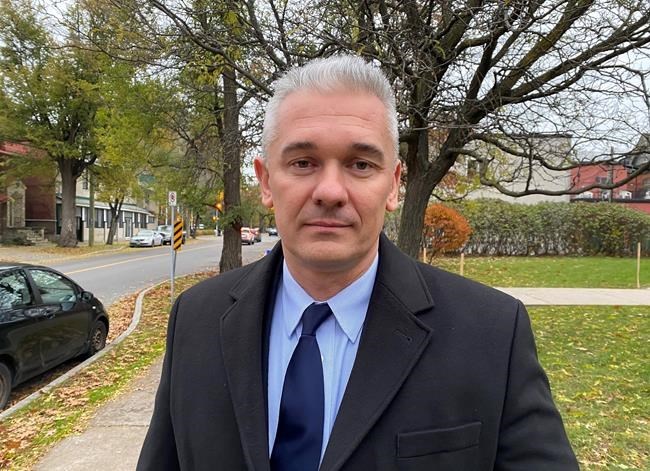
Valery Kavaleuski, the Belarus foreign affairs representative in the exiled pro-democracy government of Sviatlana Tsikhanouskaya, poses for a photo in Ottawa, Wednesday, Nov. 17, 2021. Kavaleuski has praised the support from Canada, the United States, the European Union and Britain that the Belarusian democracy movement continues to receive. THE CANADIAN PRESS/Mike Blanchfield
November 21, 2021 - 4:00 AM
OTTAWA - From the safe confines of Washington, D.C. and his comfortable World Bank job, Valery Kavaleuski was powerless to resist the riptide of democratic reform washing over his homeland of Belarus last summer.
Kavaleuski went back to the capital city of Minsk in August 2020, diving headlong into the waves of pro-democracy protests that were providing hope around an unlikely but inspiring new leader, Sviatlana Tsikhanouskaya, in the face of a massive government backlash.
"I saw the crackdown. I participated in all the marches, in the lines of solidarity and such. And I stayed for a bit longer and then longer and longer. I just didn't want to leave," Kavaleuski recalled in an interview in Ottawa this past week.
Kavaleuski – who once represented Belarus as a diplomat in the United States – praised Canada, the U.S., the European Union and Britain for their continued backing of the Belarusian democracy movement.
"Canada was among the first countries to express support," he said, talking over the bustling clatter of a Thai fast food restaurant near the University of Ottawa.
"We've seen a series of practical steps in terms of aid for the civil society, independent media, coordination of the sanctions policy," he added. "I would say this level of engagement is unprecedented."
Moments earlier, the trim, silver haired Kavaleuski had emerged from a white sedan that dropped him at the curb of the Canadian headquarters of Amnesty International. He had come from a debriefing at Global Affairs Canada before his scheduled meeting with the rights' watchdog and found time to sit down with The Canadian Press between appointments. He was next slated to attend the Halifax International Security Forum, a global conference of security leaders from democratic governments taking place in Nova Scotia this weekend.
Kavaleuski recalled how he took to the Minsk streets in the summer of 2020, joining the thousands of protestors rallying behind Tsikhanouskaya. She was running in place of her husband, whose own campaign to unseat a long-time authoritarian leader was upended after he was jailed by Belarusian authorities.
Tsikhanouskaya revitalized the opposition and drew international attention to their fight. But their hopes were dashed when President Alexander Lukashenko won a sixth term in office in the August 2020 election, a landslide that Canada and its Western democratic allies labelled as an act of fraud.
Canada joined allies by levelling human rights sanctions against the authoritarian leader and his top associates because of the violence Lukashenko's forces directed at protestors who refused to vacate the streets. Global Affairs said the sanctions came in response to "gross and systematic human rights violations."
Former foreign affairs minister Francois-Philippe Champagne was among the first Western politicians to meet with Tsikhanouskaya last October in Lithuania, where she fled for safety after the election.
Kavaleuski, meanwhile, joined protesters in their regular Minsk marches until Nov. 22, 2020 when he was tackled to the ground and thrown in jail. He was released several days later after paying a fine of several hundred dollars.
In December 2020, Kavaleuski answered the call to join Tsikhanouskaya's exiled democracy movement. He joined her in Lithuania, becoming its de-facto foreign minister in waiting.
In the last year, Kavaleuski said Lukashenko's crackdown had swelled the ranks of political prisoners from 15,000 to 37,000.
Meanwhile, Lukashenko has sowed mayhem beyond Belarus's borders. He recently allowed thousands of Middle East migrants into the country and directed them towards the borders with Poland, Lithuania and Latvia in what was widely seen as a step to destabilize Europe in retribution for the sanctions.
The crisis recently reached a peak with thousands of migrants trapped at the Belarus-Poland border with nowhere to go.
"Lukashenko has sent a very clear signal that the border with the EU is open here, you can come here," Kavaleuski said. "He has organized all these supplies of migrants from the Middle East."
On Thursday, one day after his meeting at Global Affairs, Canada and its fellow G7 members issued a joint statement blasting Belarus. That was the same day Belarus relented and cleared its border encampments of migrants and as Iraq repatriated hundreds of asylum seekers on a series of flights.
"These callous acts are putting peoples' lives at risk. We are united in our solidarity with Poland, as well as with Lithuania and Latvia, which have been targeted by this provocative use of irregular migration as a hybrid tactic," said the G7 statement.
"The actions of the Belarusian regime are an attempt to deflect attention from its ongoing disregard for international law, fundamental freedoms and human rights, including those of its own people."
The solidarity and support are much appreciated by the people of Belarus, said Kavaleuski, because they have a burning desire to live in a free country like their democratic neighbours throughout Europe.
"What's happening in Belarus, it's like black and white. People want democracy and freedom, and there is no geopolitical undertone," Kavaleuski said as he prepared to make his way out of the noisy eatery.
"This crisis belongs to everybody. This is not a problem of just Belarusians... because this is part of the story of this global confrontation – democracy and autocracy."
This report by The Canadian Press was first published Nov. 21, 2021.
News from © The Canadian Press, 2021